DESPERADO (1995)
Former musician and gunslinger El Mariachi arrives at a small Mexican border town after being away for a long time. His past quickly catches up with him and he soon gets entangled with the local drug kingpin and his gang.
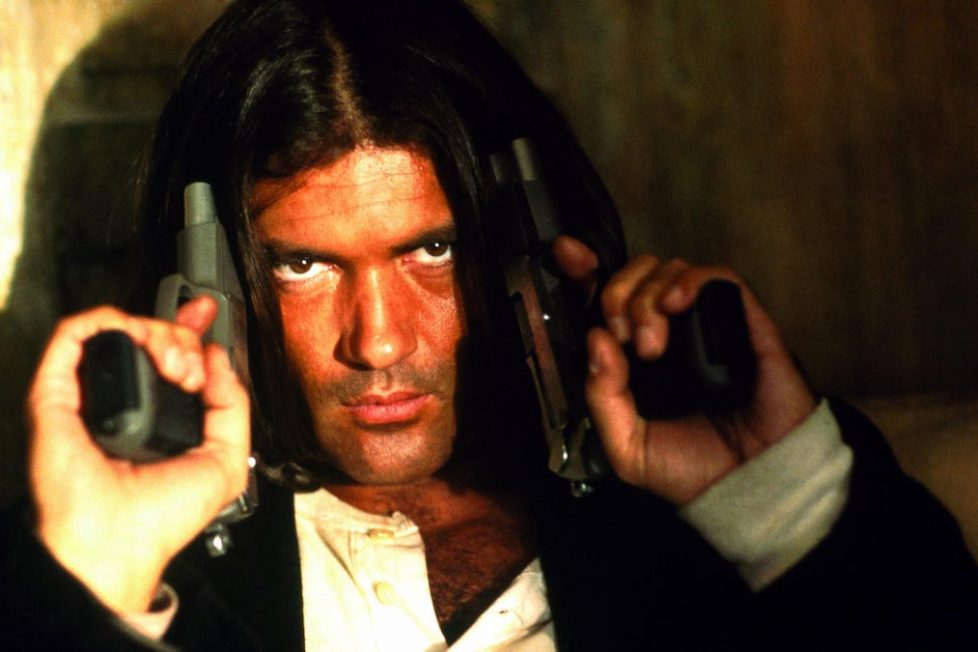
Former musician and gunslinger El Mariachi arrives at a small Mexican border town after being away for a long time. His past quickly catches up with him and he soon gets entangled with the local drug kingpin and his gang.


When it comes to filmmakers, Robert Rodriguez is easily one of my favourites. As a writer, producer, editor, and director, he’s essentially a one-man movie studio. Although his bigger productions, Spy Kids (2001) and Alita: Battle Angel (2019), haven’t fared so well commercially or critically, he’s made some undeniable gems. From vampire gore-fest From Dusk Till Dawn (1996) to teen alien invasion flick The Faculty (1998), Rodriguez’s improvisational style often turns shoestring budget productions into unexpectedly stylish and explosive hits.
After spending his formative years making short films with friends and family, Rodriguez was 23 when he burst onto the independent scene. In 1992, he made his debut feature El Mariachi working with a tiny budget of $7,000. In his 1995 memoir, Rebel Without A Crew, he explains how he raised that paltry sum by volunteering for pharmaceutical research trials in Austin, Texas. He cut corners in every element of production by working with friends and amateur actors, creating homemade blood-squibs, and shooting each scene in just one take. Yet still managed to produce an efficiently thrilling action picture that was a runaway success.
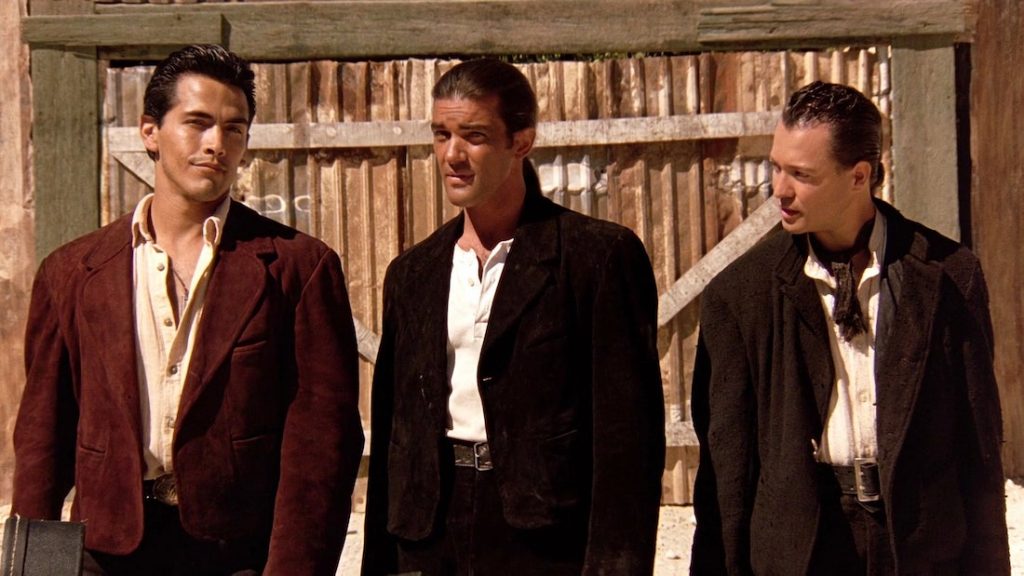
What began as a practice film for him and his friend, Carlos Gallardo, El Mariachi eventually became the first instalment of his so-called Mexico Trilogy. Rodriguez’s goal was to make a new kind of movie, one that adds “humour, a strong female character, and a clean-cut good guy who is Mexican” to the action genre. Most importantly, he wanted to challenge the cliché that “Mexicans are always the bad guys in movies”. This is understandable considering the genre by the mid-1990s had grown stale. Excluding Luc Besson’s Leon (1994), the majority of action features were as lifeless as Jean-Claude Van Damme’s acting.
In 1995, Rodriguez took his cinematic genius to the big leagues with his sophomore effort, Desperado. Working with a far larger budget of $7M, he made the most of every penny. With a star-studded cast, colourful cameos, and enough balletic gunplay to make John Woo (Face/Off) grin, the “Mariachi-style” of filmmaking made the film appear to cost $50M. Although Desperado received mediocre reviews at the time, it came in second behind Mortal Kombat (1995) on its opening weekend. However, after earning just over $25M at the box office, it was deemed a success. Rodriguez eventually followed it up, eight years later, with a sequel called Once Upon a Time In Mexico (2003), to complete his Mexico Trilogy.
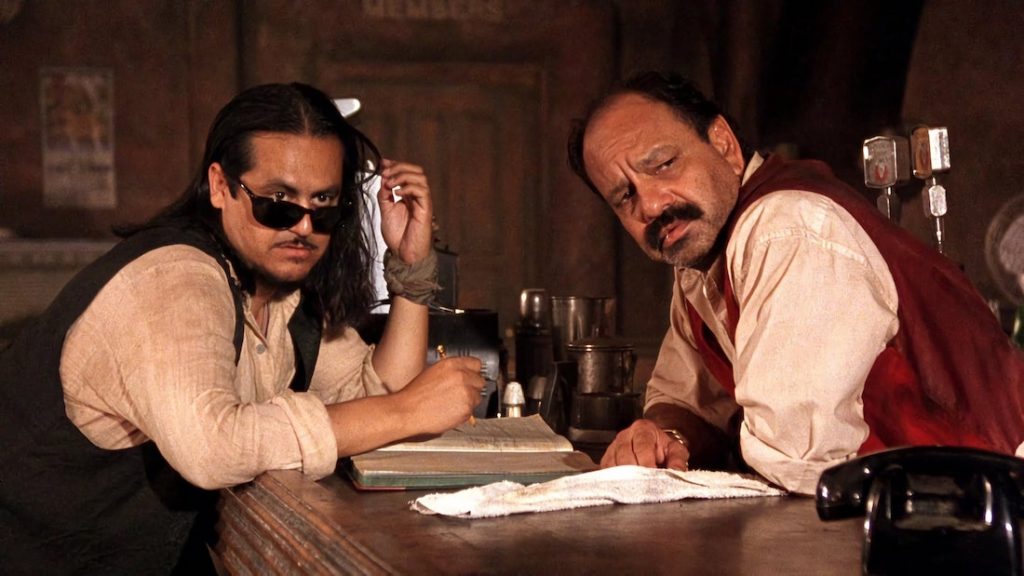
Desperado again follows the mysterious El Mariachi (Antonio Banderas), a former musician who sets out with his guitar-case arsenal to avenge his former lover’s death and the maiming of his hand. But his past catches up with him as he becomes entangled with local drug lord Bucho (Joaquim de Almeida). Unfortunately for El Mariachi, he’ll have to use every weapon in his guitar-case to take down the thugs after his life. With complications ensuing, El Mariachi finds himself falling in love with Carolina (Salma Hayek), a local bookstore owner who’s under the thumb of Bucho.
Amidst the mayhem is an entire cast of relatively unknown actors at the time. Replacing Carlos Gallardo from El Mariachi, Banderas takes over in the lead role as the broken-hearted musician seeking retribution. In 1995, Banderas had only just started making a name for himself in Hollywood, making brief appearances in Philadelphia (1993) and Interview With a Vampire (1994). However, his performance in Desperado catapulted him into the mainstream, with him taking the lead role in The Mask of Zorro (1998).
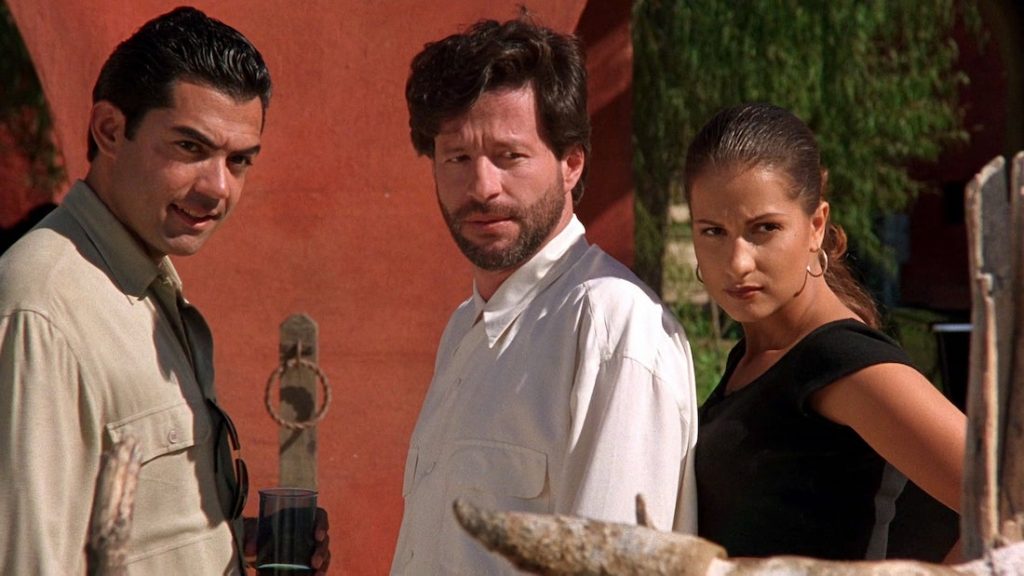
Simultaneously, Desperado introduced most audiences to the beautiful Salma Hayek. After working with Rodriguez on the feature-length television drama Roadracers (1994), the filmmaker continues his strong collaboration with the actress in what’s arguably one of her best roles. While it didn’t pay her too much, it still got her established in Hollywood and Hayek returned to work with Rodriguez in From Dusk Till Dawn before starring in Fools Rush In (1997), Dogma (1999), and Wild Wild West (1999).
The chemistry between the international smoulder of Banderas and the drop-dead gorgeous Hayek sizzles off the screen. Considering Banderas didn’t have full command of the English language at the time, he pushes the right amount of energy into every line. He exudes the perfect amount of cool and sex appeal, whilst maintaining the look of an action-hero who’s tough, nasty, and vengeful… and yet heartfelt and sweet, to giving his character some substance. Similar to Clint Eastwood in The Good, The Bad and The Ugly (1966) and Steve McQueen in The Cincinnati Kid (1965), he’s a homage to the grand cinematic tradition of heroes who let their actions do the talking.
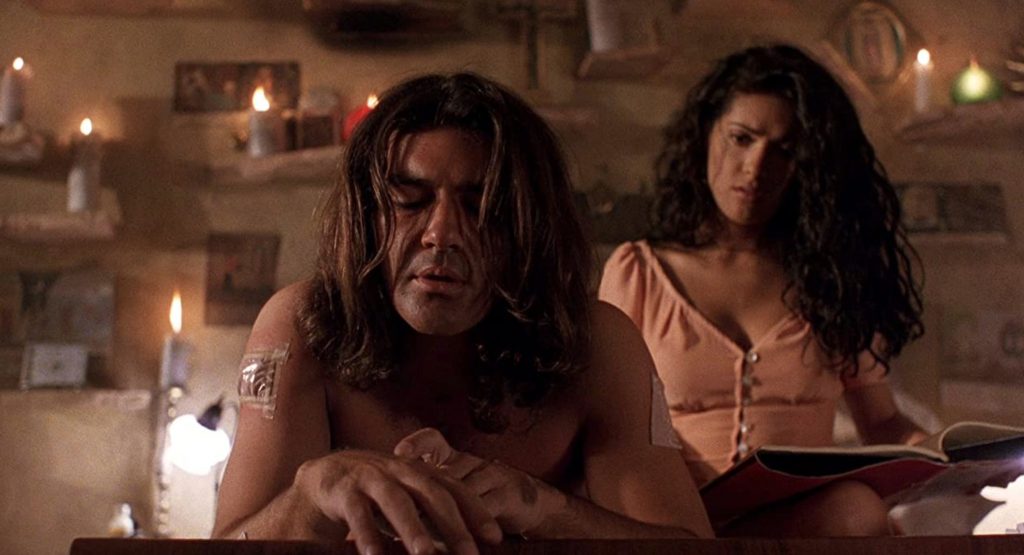
The sultry-eyed Hayek plays bookshop owner Caroline; fiery and beautiful with plenty of charisma and humour that makes her character more than just a dull love interest. Banderas and Hayek are as perfectly matched as one can find for a feature such as this.
Joining them for the ride are plenty of familiar faces. As a precursor to his future Machete (2010) character, Danny Trejo appears as a Mexican assassin who dispatches his victims with throwing knives. Surprisingly, Trejo had been appearing in movies for over a decade before this, including Death Wish 4: The Crackdown (1987) and Lock Up (1989). However, Desperado began his ascension to being one of the most successful character actors ever. Cheech Marin (Cheech and Chong: Up In Smoke) is hilarious as a scumbag bartender that serves what looks like the world’s worst beer; Joaquim de Almeida (Clear and Present Danger) plays Bucho, the ruthless kingpin who wants El Mariachi dead, creating a nice rivalry with Banderas full of suspense and thrills; but the highlight has to be Steve Buscemi (Reservoir Dogs) as El Mariachi’s right-hand man, Buscemi. The character was written with the actor in mind and he’s perfect for the role, delivering a classic opening monologue.
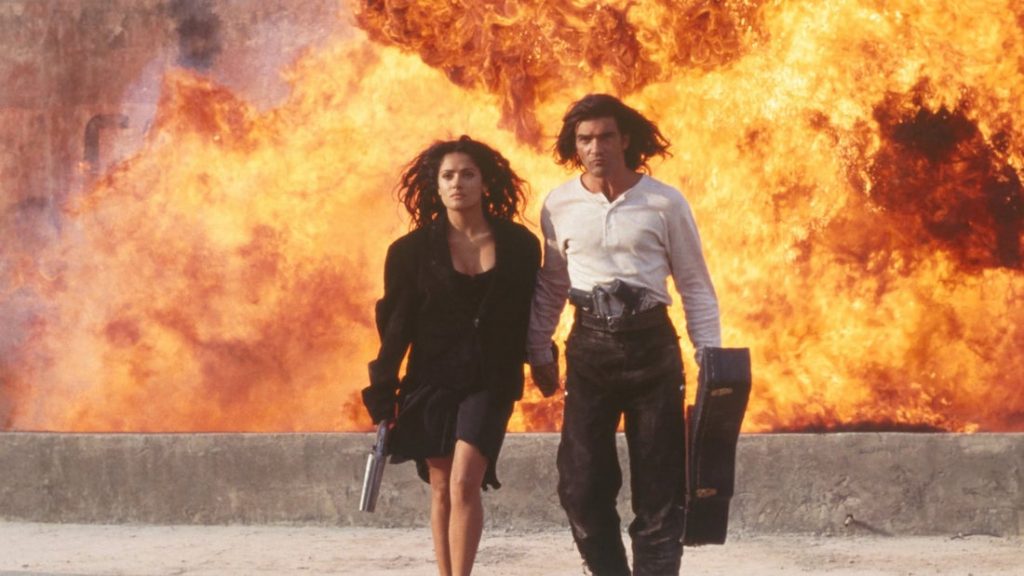
Rodriguez did a fantastic job stepping into the studio world while keeping his indie sensibilities. His stylish filming and editing make his feature look even grander than it was. Desperado carefully walks a fine line between different genres while refusing to be boxed into a corner. The gritty cinematography and aesthetic qualities resemble the grindhouse movies of the 1970s, while the Mexican environment and shootouts feel like a modern-day Spaghetti Western. It’s never easy to blur genre lines and do it successfully, but Rodriguez manages to recreate a dead genre in the same vein as the Coen Brothers did with Blood Simple (1984). Whether it’s the comic-book noir Sin City (2005) or the pulpy horror Planet Terror (2007), he always finds a new and innovative way to tell his stories.
With a budget 1,000 times that of El Mariachi, Rodriguez’s zest and enthusiasm for filmmaking remains the main draw to Desperado. Its cartoonish violence increases just as quickly as the body count! Many of the action sequences are hilariously exaggerated, yet choreographed like an intricate dance. Bullets fly recklessly as bars erupt into a blaze of gunfire and explosions create the perfect backdrop for our heroes. It all culminates with a crazy finale involving two Mariachis with guitar cases hiding a machine gun and a rocket launcher. Rodriguez’s habitual approach of rapidly cutting between several different angles makes the action sequences fast and fluid. With the possible exception of John Woo, one would argue nobody choreographs violence as stylish as Rodriguez. They’re slickly handled in an explosive manner that owes a big debt to the likes of Sergio Leone’s A Fistful of Dollars (1964) and Sam Peckinpah’s The Wild Bunch (1969).
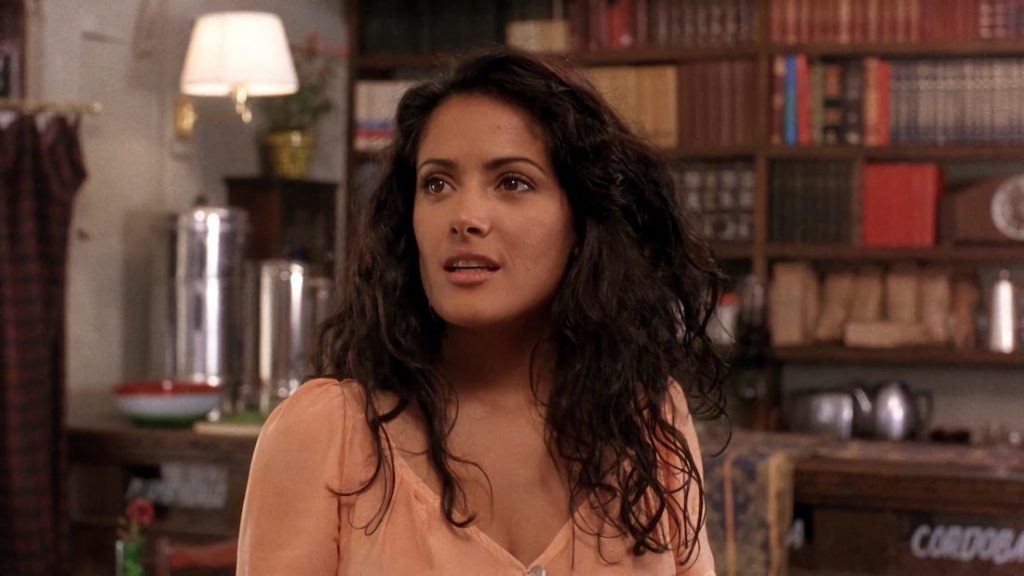
It’s evidently clear that Rodriguez was heavily influenced by his frequent collaborator Quentin Tarantino. The story’s simple revenge scenario could have been strictly routine. However, Rodriguez throws in enough twists and turns to keep Desperado interesting from beginning to end. The script strives to be hip and cool like Pulp Fiction (1994) but in an outlandish and funny way. The opening scene is a personal favourite and perfectly sets the tone for what’s to follow, with a masterful monologue from Buscemi. After walking into a bar, he gives an eyewitness account of the wrath of the mysterious El Mariachi, claiming to have been in another bar a few towns away when “the biggest Mexican he had ever seen” walked in carrying a guitar case full of weapons. Buscemi’s hilarious dialogue is intercut with glimpses of OTT acts of violence before ending with “I think he’s coming this way.”
Similar to Sam Raimi’s The Quick and the Dead (1995), Desperado walks a fine line between myth-making and parody. Arguably, some of the cartoon violence may be overtly comedic for some. However, the humour is never too distracting. Together with the infamous Tarantino cameo where we’re treated to a long-winded yet hilarious joke, there’s a great scene where Rodriguez manages to build tension whilst maintaining cheeky humour. After a passionate night, Carolina sits in front of El Mariachi softly singing and he wakes up to spot a hitman moving into view being the curtains. He trains his gun on the man, then another appears from the opposite side. As he holds his guns on both men, they converge in the centre… where El Mariachi finds both of his weapons pointing at his girlfriend’s blissfully oblivious face. It’s a great example of how Rodriguez is able to blend dark comedy and action seamlessly.
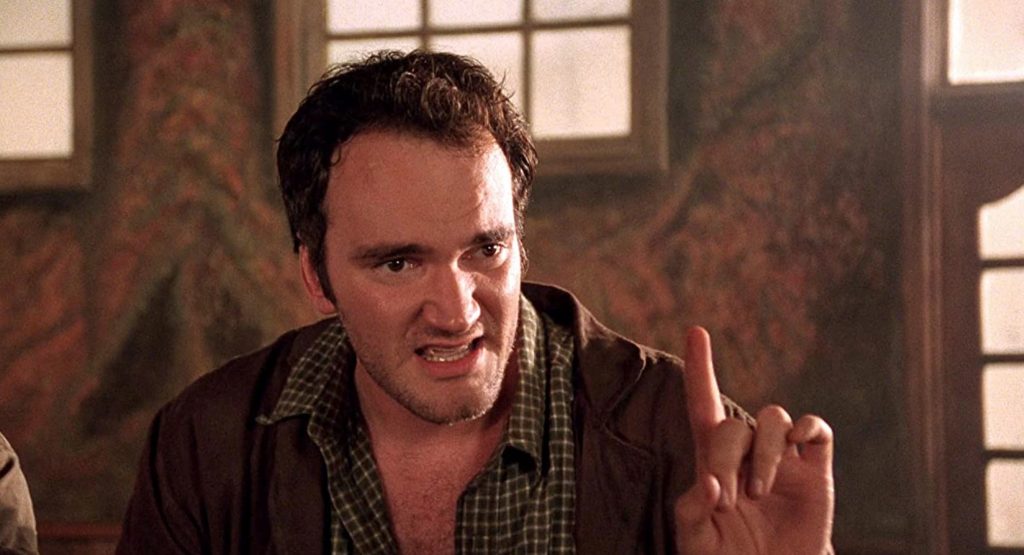
Rodriguez, who dodged the studio suggestion of giving the Mariachi an electric guitar, found ways to incorporate much more music this time around. The songs from the likes of Los Lobos, Tito and Tarantula, and an assortment of other acts, are seductive and beautifully integrated into sequences. Whether it’s the opening credits where we see Banderas actually performing Los Lobos’ “Cancion del Mariachi”, or Tito and Tarantulas’ “Strange Face of Love” during the introduction of Carolina, Rodriguez projects his love for high-octane, Mexican-infused rock infectiously and it’s a joy to listen to. There’s also an excellent moment where El Mariachi teaches a little boy named Solo (Abraham Verduzco) to play a song. Similar to Once Upon a Time in the West (1968), it acts as a great way of spooking the antagonists as they hear the song playing outside the scene of the massacres.
In many respects, Desperado is Rodriguez’s Evil Dead II (1987). It could be argued that it’s a remake of El Mariachi since the plot feels like a repeat. The only difference being the substantial amount of money backing it and the larger cast. Nonetheless, Desperado is a boisterous, action-packed follow up that doesn’t take itself too seriously. It’s full of panache and style, like a Spaghetti Western shot by the lovechild of Sergio Leone and John Woo. What bubbles beneath all of Rodriguez’s work is the joy of filmmaking, and with Desperado he conveys that perfectly. It’s exciting, sexy, and fun. The perfect recipe for an action feature.
USA • MEXICO | 1995 | 104 MINUTES | 1.85:1 | COLOUR | ENGLISH • SPANISH

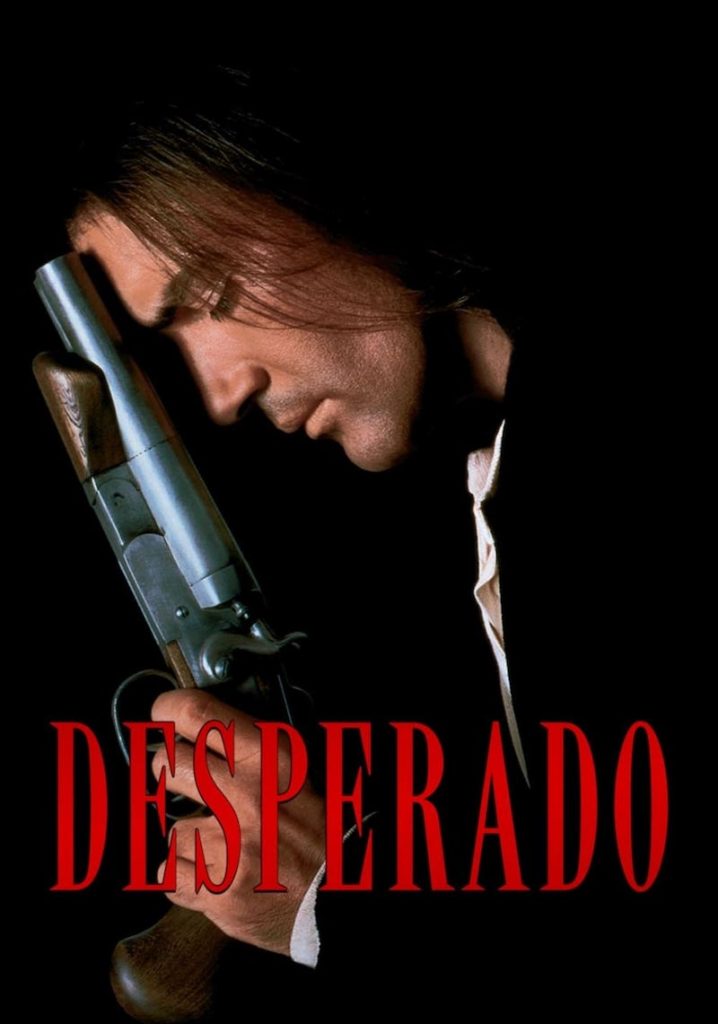
writer & director: Robert Rodriguez.
starring: Antonio Banderas, Joaquim de Almeida, Salma Hayek, Steve Buscemi, Cheech Marin & Quentin Tarantino.
